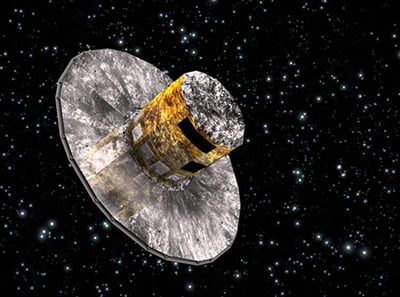 Exactly how big is our universe? While, it was once hard to say – and see – thanks to all the micro clusters of stars and planets as well as dust and gas, the Gaia satellite, with help by Materion, is equipping cosmologists with the information they’ve been waiting light years to see. The mission of the satellite was to collect space data on over one billion stars, planets, comets, asteroids and quasars. The information collected and released this week has astounded scientists, redefining the very foundation of astronomy. Materion is proud to have played in an essential role in these discoveries by supplying Gaia instrumentation with large and complex optics with the use of high performance optical coatings.
Exactly how big is our universe? While, it was once hard to say – and see – thanks to all the micro clusters of stars and planets as well as dust and gas, the Gaia satellite, with help by Materion, is equipping cosmologists with the information they’ve been waiting light years to see. The mission of the satellite was to collect space data on over one billion stars, planets, comets, asteroids and quasars. The information collected and released this week has astounded scientists, redefining the very foundation of astronomy. Materion is proud to have played in an essential role in these discoveries by supplying Gaia instrumentation with large and complex optics with the use of high performance optical coatings.
Gaia is a space observatory of the European Space Agency (ESA) designed to “skymap” the galaxy and beyond. Containing telescopes, cameras and other powerful instrumentation, the main job of this satellite is to observe and measure astronomical objects to create a 3D space catalog – which is the largest and most precise catalog ever made. In its 22 months of charting the sky, multiple discoveries have been made with plenty more expected to follow. Gaia has also detected tens-of-thousands of Jupiter-sized exoplanets beyond the depths of our solar system as well as revealing previously unseen details of the Milky Way.
Part of Gaia’s success in obtaining high-precision measurements is due in part to specialized equipment like the Radial Velocity Spectrometer (RVS) and Blue and Red Photometer instruments (BP/RP). How did Materion contribute? Our precision optics helped aid the successful mission by providing coatings for the optical payloads of the RVS and photometers. These amazing instruments have and will continue to record detailed physical properties of all the stars observed including their location, color, brightness, surface temperature, gravity and composition. The level of precision means Earth-bound observers are able to spot a coin lying on the surface of the Moon!
For the astronomy community, the impact of this massive data collection is powerful beyond imagination. Scientists will use this information to tackle a wide range of important questions related to how our galaxy began and how it will evolve over time – maybe they truly did stumble upon the galactic version of a fortune teller!